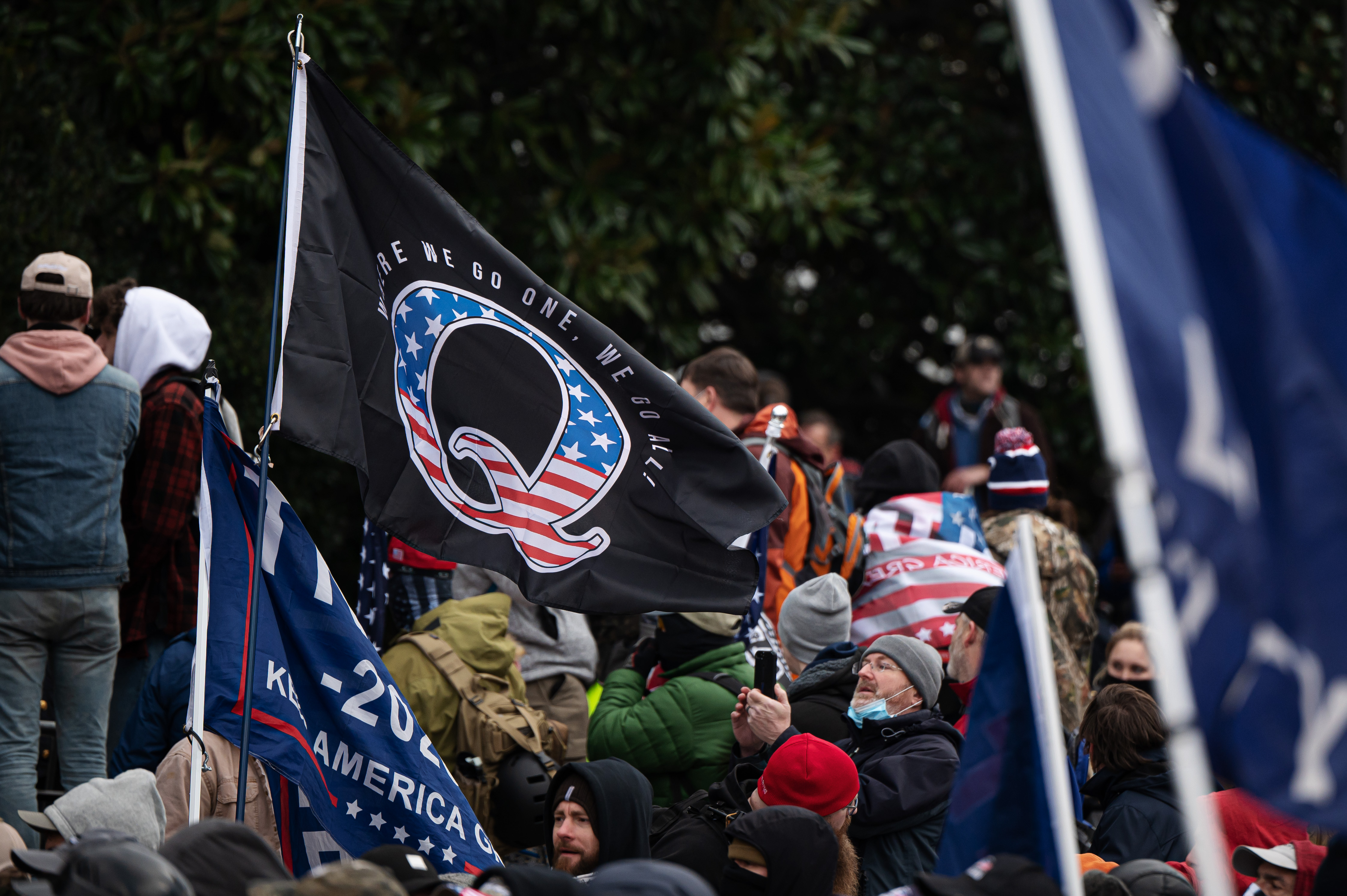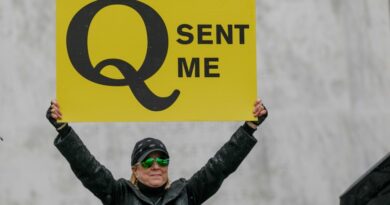How to respond to the QAnon threat

On Wednesday, Jan. 6, 2020, a mob of conspiracy theorists left their online world and appeared in person in Washington, D.C., to take part in a violent insurrection. Encouraged by then-President Donald Trump, who, they believed, was to lead their revolution, QAnon conspiracists, along with other far-right elements, were at the violent vanguard. Many of those who stormed the Capitol appear to have believed that they were bringing about “The Storm,” a day of reckoning for the members of an alleged Satanic cabal who “stole” the election from their messianic leader, according to Q mythology.
The role of QAnon supporters in the riot should have come as no surprise. QAnon messages have reached Trump, who has amplified them in turn, as documented by a December report by the Network Contagion Research Institute (NCRI) and American University. The movement’s violent nature and the susceptibility of individuals to the conspiracy theory has made QAnon a significant threat to democracy. Federal authorities are beginning to recognize that threat, and in 2019 the FBI named QAnon as a domestic terrorism threat. At her recent confirmation hearing, Avril Haines, President Joe Biden’s pick to lead the U.S. intelligence, committed to producing a public assessment of the threat posed by QAnon.
The violence of Jan. 6 made clear that the health of online communities and the spread of disinformation represents a major threat to U.S. democracy, and as the Biden administration takes office, it is time for policymakers to consider how to take a more active approach to counter disinformation and form a public-private partnership aimed at identifying and countering disinformation that poses a risk to society.
The Q threat
Successful conspiracy movements are motivated by a sense of existential threat. QAnon has been remarkably effective at creating such a threat, in part by “gamifying” the hunt for clues and to solve the mysteries within Q’s conspiracy theories. Using codewords on social media, members transmit and expand an elaborate story of good and evil, providing psychological rewards for solving mysteries with hidden clues. QAnon’s scope, popularity, and the speed with which it has spread across the web is unprecedented in the history of conspiracy theorists. As of NCRI’s December assessment, it was active in at least 71 countries. As documented in a June NCRI report, the Q movement increasingly overlaps with U.S. militia groups, and Q adherents are growing increasingly militarized.
The Q community provides its members with a seductive combination: a fight against an existential threat, a strong sense of belonging for those in the community, and the understanding that any one of its members can make meaningful contributions to what is seen as a righteous crusade. These factors provide an attractive lure to potential believers. An unshakable distrust of mainstream media and “elites” facilitates belief in the increasingly fantastical mythology of the movement, while motivating and justifying the in-group/out-group dynamic responsible for ruined friendships, alienated families, and broken community bonds left in QAnon’s wake.
Financial incentives provide further fuel to the movement: Spreading disinformation can be an easy way to make money with relatively little overhead. Products that range from merchandise to supplements are being sold alongside conspiracy theories, and lifestyle influencers are marketing the theory. This is lucrative for those who want to capitalize on credulousness.
Online disinformation is contagious. And as recent events indicate, that disinformation increasingly poses real threats to people, property, and even our democratic institutions.
An active approach toward disinformation
Combating disinformation is possible using data-driven methods and responsive reporting. Because disinformation crosses platforms and transcends political boundaries, doing so effectively requires a non-partisan public-private partnership.
As the Biden administration takes office, developing such a partnership will be essential. In particular, we recommend the following:
- An independent, non-partisan public trust should be established to provide responsive insights and policy recommendations to defend democracies against threats of disinformation and the illiberal forces at work disseminating it.
- Such a Center for Disinformation Defense (CDD) could play a vital role both in identifying emerging trends and methods of sharing disinformation, thereby protecting the health of our public conversation.
- The proliferation of misinformation and disinformation is contingent on people’s inability to distinguish fact from fiction in a rapidly changing information environment. A CDD can support data-driven initiatives to improve digital media-literacy.
As the violence on Jan. 6 made clear, no issue is more pressing to the health and functioning of American democracy than effectively and comprehensively tackling disinformation. A well-staffed and funded CDD can help citizens, government officials, and civil society groups to distinguish truth from falsehood and maintain a peaceful and pluralist liberal society. The Biden administration, civil society, and technology sector should make establishing such a public-private partnership a top priority.
Pamela Paresky is a visiting senior research associate at the University of Chicago’s Stevanovich Institute on the Formation of Knowledge. She serves as Senior Scholar at the NCRI.
Alex Goldenberg is lead intelligence analyst at the NCRI.
Denver Riggleman is a former congressman for Virginia’s 5th district and a former USAF Intelligence Officer. He serves as chief strategist for the NCRI and CEO of Riggleman Information and Intelligence Group (RIIG).
Jacob N. Shapiro is professor of politics and international affairs at Princeton University and managing director of the Empirical Studies of Conflict Project.


